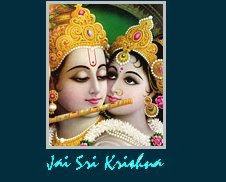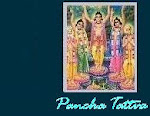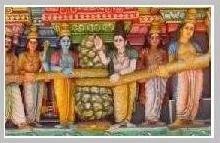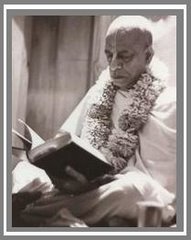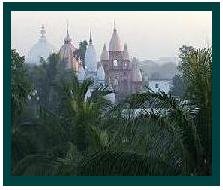 The fact is that my native land is a prey to barbarism, that in it men's only God is their belly, that they live only for the present, and that the richer a man is the holier he is held to be.
The fact is that my native land is a prey to barbarism, that in it men's only God is their belly, that they live only for the present, and that the richer a man is the holier he is held to be.-Saint Jerome
"Athato Brahma-Jijnasa.. Now in this human form of life, inquire about the absolute truth". - Vedanta Sutra -
CC Adi lila 4.87:
"krsna vancha purti rupa kare aradhane ataeva radhika nama purane vakhane"
Her worship (aradhana) consists of fulfilling the desires of Lord Krsna. Therefore the Puranas call Her Radhika.
His Divine Grace, Srila A.C. Bhaktivedanta Swami Prahbupada, on Radhastami, September 18, 1969, in London spoke the following:
"So what is the position of Srimati Radharani? We should try to understand this day and offer our obeisances to Radharani. Radhe vrndavanesvari.
tapta-kancana-gaurangi radhe vrndavanesvari
vrsabhanu-sute devi pranamami hari-priye
Our business is "Radharani, You are so dear to Krsna. So we offer our respectful obeisances unto You."
tapta-kancana-gaurangi radhe vrndavanesvari
vrsabhanu-sute devi pranamami hari-priye
Radharani is hari-priya, very dear to Krsna. So if we approach Krsna through Radharani, through the mercy of Radharani, then it becomes very easy. If Radharani recommends that "This devotee is very nice," then Krsna immediately accepts, however fool I may be. Because it is recommended by Radharani, Krsna accepts. Therefore in Vrndavana you'll find all the devotees, they're chanting more Radharani's name than Krsna's. Wherever you'll go, you'll find the devotees are addressing, "Jaya Radhe." You'll find still in Vrndavana. They are glorifying Radharani. They're more interested, worshiping Radharani. Because however fallen I may be, if some way or other I can please Radharani, then it is very easy for me to understand Krsna. Otherwise, manusyanam sahasresu kascid yatati siddhaye yatatam api siddhanam kascid vetti mam tattvatah (Bg. 7.3)
If you go by the speculative process to understand Krsna, it will take many, many lives. But if you take devotional service, just try to please Radharani, and Krsna will be gotten very easily. Because Radharani can deliver Krsna. She is so great devotee, the emblem of maha-bhagavata. Even Krsna cannot understand what is Radharani's quality. Even Krsna, although He says vedaham samatitani, "I know everything," still, He fails to understand Radharani. Radharani is so great. He says that... Actually, Krsna knows everything. In order to understand Radharani, Krsna accepted the position of Radharani. Krsna wanted to understand the potency of Radharani. Krsna thought that "I am full. I am complete in every respect, but still, I want to understand Radharani. Why?" This propensity made Krsna obliged to accept the propensities of Radharani, to understand Krsna, Himself.
These are, of course, very transcendental, great science. One who is advanced in Krsna consciousness and well conversant with the sastras, they can understand. But still, we can discuss from the sastra. When Krsna wanted to understand Himself, He took the tendency of Srimati Radharani. And that is Caitanya Mahaprabhu. Radha-bhava-dyuti-suvalitam. Caitanya Mahaprabhu is Krsna, but He has accepted the propensities of Radharani. As Radharani is always in feelings of separation of Krsna, similarly, in the position of Radharani, Lord Caitanya was feeling separation of Krsna. That is the teachings of Lord Caitanya, feelings of separation, not meeting. The process of devotional service taught by Caitanya Mahaprabhu and His disciplic succession is how to feel separation from Krsna. That is Radharani's position, always feeling the separation. "
The 25 qualities of Srimati Radharani by which She captures Krsna:
1) She is sweetness personified.
2) She is a fresh young girl.
3) Her eyes are always moving.
4) She is always brightly smiling.
5) She possesses all auspicious marks on Her body.
6) She can agitate Krsna by the flavor of Her person.
7) She is expert in the art of singing.
8) She can speak very nicely and sweetly.
9) She is expert in presenting feminine attractions.
10) She is modest and gentle.
11) She is always very merciful.
12) She is transcendentally cunning.
13) She knows how to dress nicely.
14) She is always shy.
15) She is always respectful.
16) She is always patient.
17) She is very grave.
18) She is enjoyed by Krsna.
19) She is always situated on the highest devotional platform.
20) She is the abode of love of the residents of Gokula.
21) She can give shelter to all kinds of devotees.
22) She is always affectionate to superiors and inferiors.
23) She is the greatest amongst Krsna's girlfriends.
24) She is obliged by the dealings of Her associates.
25) She always keeps Krsna under Her control.
On pg 175 in "Nectar of Devotion," Srila Prabhupada writes, "A person who is unable to bear another's distress is called compassionate...Actually, because Krsna is the Supreme Personality of Godhead, it is very difficult to approach Him. But the devotees, taking advantage of His compassionate nature, which is represented by Radharani, always pray to Radharani for Krsna's compassion."
 A cross-cultural analysis published in the British Journal of Psychiatry found a strong correlation between refined sugar consumption and mental illness. Researchers found that a high national intake of refined sugar predicted a higher incidence of schizophrenia and depression. Research published in Neuroscience in 2002 found a high fat, high sugar diet reduces a key growth hormone in the brain necessary for memory and learning. Research into the correlation between diet and mental illness is finally expanding. This new research is shedding much needed light on the reality that diet does play a role in the incidence of mental illness.
A cross-cultural analysis published in the British Journal of Psychiatry found a strong correlation between refined sugar consumption and mental illness. Researchers found that a high national intake of refined sugar predicted a higher incidence of schizophrenia and depression. Research published in Neuroscience in 2002 found a high fat, high sugar diet reduces a key growth hormone in the brain necessary for memory and learning. Research into the correlation between diet and mental illness is finally expanding. This new research is shedding much needed light on the reality that diet does play a role in the incidence of mental illness.+++++++++++++++++++++++++++++++++
Refined sugar consumption suppresses brain-derived neurotrophic factor or BDNF, an important growth hormone in the brain. This growth hormone is extremely important for the health of neurons in the brain. BDNF triggers new connections between neurons in the brain which is crucial for memory function. Studies have shown low BDNF levels in patients with depression and schizophrenia. The consumption of refined sugar has the potential to exacerbate depression and schizophrenia by contributing to low BDNF levels.
Refined sugar is notorious for causing increased inflammation in the body. Regular consumption of refined sugar can lead to chronic inflammation which can disrupt immune system functioning. Chronic inflammation is implicated in arthritis, some forms of cancer, diabetes, and heart disease among many other illnesses. Chronic inflammation has also been linked to a higher risk of depression and schizophrenia. Psychologists who have become aware of the recent research on sugar and mental illness have begun recommending sugar free diets to patients.
Dr. IIardi, associate professor of psychology at the University of Kansas, stated that he has encouraged depressed patients to remove refined sugar and refined foods from their diets. Patients who were willing to comply to these recommendations reported significant improvements in mental clarity, mood and energy. Research and patient experiences indicate that a diet high in whole grains and low in refined foods and sugar can provide significant improvement in mental health, clarity and reduced risk of mental illness.
Learn more:http://www.NaturalNews.com/032689_sugar_mental_illness....
 On the 19th of March 2011 the moon was very close to the earth and full. Closer than it has been in twenty years. Sri Chaitanya Mahaprabhu appeared on a full moon a little over 500 years ago on this date. It was predicted in the scriptures that he would distribute the Holy Names of the lord to everyone regardless of caste, religion, race etc. In this age of quarrel and hypocrisy where in the majority of people have lost their way due to being misguided by crooked leadership, can easily approach the Supreme Lord by his name and be freed from all material contamination enabling one to perfect his human form of life.
On the 19th of March 2011 the moon was very close to the earth and full. Closer than it has been in twenty years. Sri Chaitanya Mahaprabhu appeared on a full moon a little over 500 years ago on this date. It was predicted in the scriptures that he would distribute the Holy Names of the lord to everyone regardless of caste, religion, race etc. In this age of quarrel and hypocrisy where in the majority of people have lost their way due to being misguided by crooked leadership, can easily approach the Supreme Lord by his name and be freed from all material contamination enabling one to perfect his human form of life. We all know Albert Einstein in his attempt to understand the creation studied the Gita upanisad (Bhagavad-Gita). He has quoted portions of the Gita on many occasions. When reading this I immediately thought of Sri Krishna. The picture he paints by his words is very clear.
We all know Albert Einstein in his attempt to understand the creation studied the Gita upanisad (Bhagavad-Gita). He has quoted portions of the Gita on many occasions. When reading this I immediately thought of Sri Krishna. The picture he paints by his words is very clear. va-bhutani kaunteya
va-bhutani kaunteya
